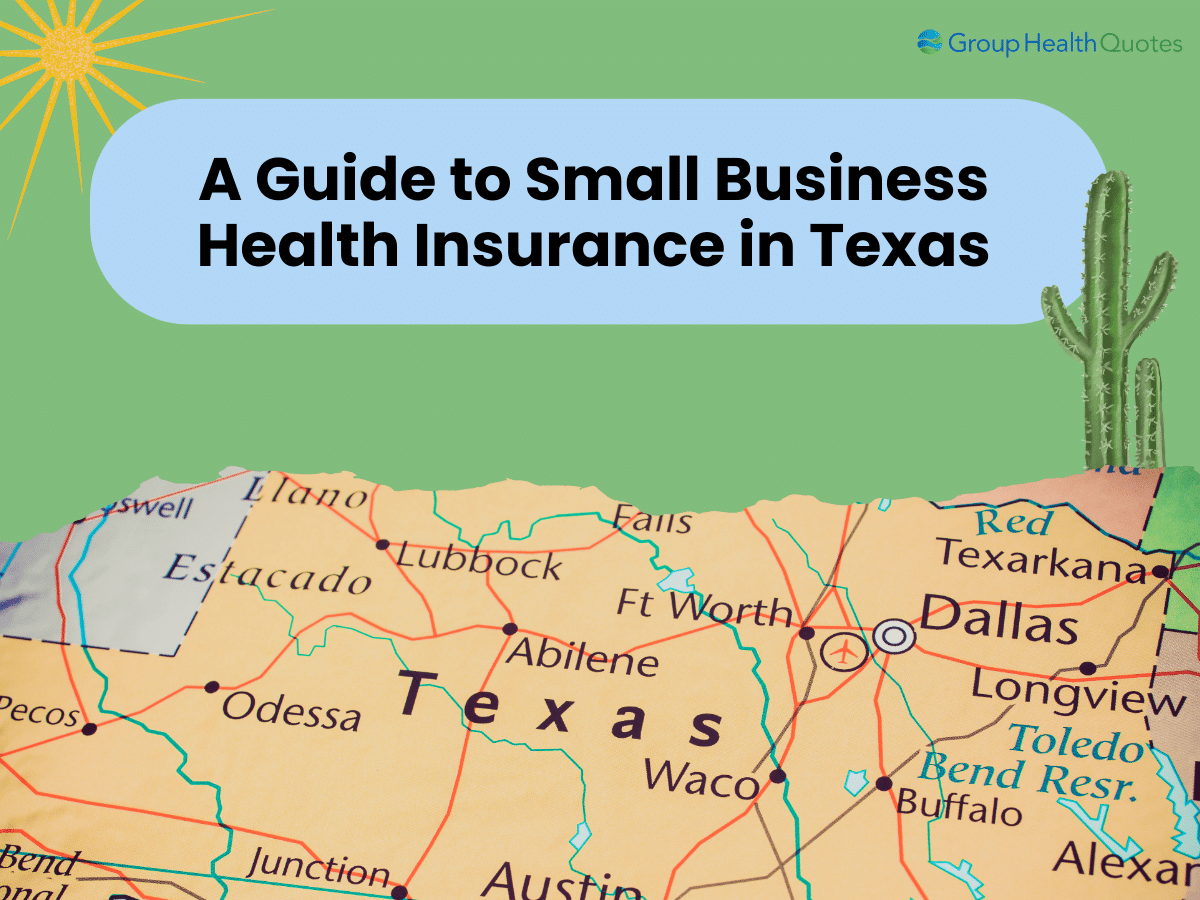Health insurance is essential for businesses of all sizes, but especially for small businesses looking to stand out to prospects in the competitive job market.
In this guide we’ll walk you through everything you need to know about small business health insurance in Texas.
You’ll learn about the various plan options that are available, the top in-state providers, alternatives to traditional health insurance and valuable tax credits to help your business save.
Are you ready to protect and support your team? Let’s get started!

Texas Small Business Health Insurance Options
Texas offers a variety of health insurance options for small businesses, including traditional group health insurance plans, flexible alternatives, and marketplace plans. Let’s take a closer look:
Private Group Health Insurance Plans
Private group health insurance plans are your typical plans that are offered by insurance companies. They provide a wide range of customizable coverage options, with benefits that can be tailored to fit employee needs. In Texas specifically, private group plans are popular in industries such as manufacturing and technology, where competitive benefits are necessary to attract talented employees.
SHOP Marketplace
The Small Business Health Options Program (SHOP) is a federal online marketplace designed to help small businesses find affordable health insurance. Texas small businesses that meet the requirements for eligibility can use SHOP to obtain tax credits, further lowering the cost of coverage.
In order to use the SHOP Marketplace, your business must:
- Employ 1 to 50 full-time equivalent employees (FTEs).
- Offer health insurance to all full-time employees.
- Meet minimum participation requirements (70% of employees must enroll).
- Have a physical office or employee work site in Texas.
SHOP can be especially beneficial for small businesses with fewer than 25 employees, as they may qualify for additional federal tax credits.
How Does Small Business Health Insurance In Texas Work?
For Texas small businesses, the basics of health insurance enrollment and costs are straightforward:
Step 1: The employer decides the types of health insurance plans to provide to employees. Many insurers allow employers to offer a variety of plan types, providing employees greater options.
Step 2: Employers and employees split premium expenses, with employers typically covering approximately 50% (though this can vary). The balance is withheld from the employees’ paychecks.
Step 3: Enrollment can take place at any time of year, and renewals typically occur annually. Employees can only modify their plan during the renewal period or if they have a qualifying event (such as marriage or the birth of a child).
Types of Small Business Health Insurance Plans in Texas
Texas business owners have several types of insurance plans to choose from:
Health Maintenance Organization (HMO): Provides lower premiums but requires employees to stay inside a network and get referrals from a primary care physician for specialist appointments.
appointments.
Preferred Provider Organization (PPO): Provides the option to see out-of-network providers at a greater cost and does not require referrals for specialist visits.
Exclusive Provider Organization (EPO): Similar to an HMO, but does not require referrals to see specialists. Employees must remain within the network unless there is an emergency.
Point of Service (POS): A hybrid of HMO and PPO features. POS plans require referrals for specialists while allowing some out-of-network access at an additional cost.
High Deductible Health Plan (HDHP) with Health Savings Account (HSA): Has cheaper monthly premiums, but a larger deductible. An HSA allows employees to save pre-tax dollars for medical bills, which is popular in industries like oil and gas, where employees seek flexible, cost-effective solutions.
Top Small Business Health Insurance Providers in Texas
Selecting a trustworthy provider is crucial for small businesses in Texas. Here are the top ranked health insurance companies in Texas today:
Blue Cross Blue Shield of Texas: Well-known in Texas for its large network and range of adaptable plans, BCBS is perfect for companies of all kinds.
Aetna: Aetna is another great option for small businesses in Texas. They specialize in competitive plans that offer telehealth and wellness program options.
Cigna: Cigna’s plans emphasize digital health services and preventative care, making them an attractive option for small companies that place a high value on employee wellness.
Humana: Popular among Texas companies in the healthcare and retail industries, Humana is well-known for its adaptable group plans and wellness-focused choices.
UnitedHealthcare: Offering a variety of plans intended for small Texas businesses, ranging from basic coverage to comprehensive options. UnitedHealthcare also prides themselves on their offers a vast network and cutting-edge digital tools.
Alternative to Traditional Health Coverage in Texas
Texas also offers some flexible options for businesses who are looking for alternatives to traditional group health insurance:
Individual Coverage Health Reimbursement Arrangement (ICHRA): Allows employers to provide a monthly allowance that employees can use to purchase individual health insurance. ICHRA is popular with Texas’s diverse industries, as it allows employees to choose plans that meet their unique needs.
Qualified Small Employer Health Reimbursement Arrangement (QSEHRA): Just like ICHRA’s, but designed specifically for businesses with fewer than 50 employees. QSEHRA provides tax-free reimbursements for individual health insurance and medical expenses.
Short-Term Health Plans: Offers temporary coverage for up to 12 months, suitable for businesses needing affordable, basic coverage options for seasonal or temporary workers.
Health Sharing Programs: Though not traditional insurance, these programs pool members’ resources for medical expenses. They are more affordable, but come with fewer coverage guarantees.
Association Health Plans (AHPs): Allows small businesses in specific industries, such as agriculture or construction, to join forces and purchase group health insurance at a discounted rate.
The Cost of Small Business Health Insurance in Texas
The cost of health insurance for small businesses in Texas can vary greatly depending on numerous factors:
- Business Size: Larger organizations may receive better rates, while smaller businesses usually pay more per person.
- Employee Demographics: Age, geographical location, and overall health all have an impact on premiums. For example, businesses with older and higher-risk groups usually pay the most.
- Plan Type: Flexible plans, such as PPOs, are typically more expensive than HMOs and HDHPs.
- Coverage Level: Plans with low deductibles and out-of-pocket maximums have higher premiums, whereas high deductible plans have lower premiums but greater out-of-pocket costs.
- Employer Contributions: Higher employer contributions lower employees’ premium costs while increasing the business’s overall expenses.
Tax Credits and Financial Programs for Small Business in Texas
Texas small businesses can take advantage of many tax breaks to help make health insurance even more affordable:
Small Business Health Care Tax Credit: Businesses with less than 25 full-time employees may be eligible for a federal tax credit of up to 50% of premium costs if they provide coverage through SHOP. To be eligible, companies must pay at least 50% of employee premiums and meet specific salary requirements.
Employer Contributions to HSAs: Employers who offer HDHPs can make tax-deductible contributions to employee HSAs, providing a tax-advantaged way to cover medical expenses while also helping employees save money on healthcare costs.
Tax-free Reimbursements through QSEHRA and ICHRA: These arrangements allow companies to offer tax-free reimbursements for individual health insurance, giving flexibility and affordability without a traditional group health plan.
Health Insurance Regulations in Texas
Texas has numerous regulations affecting small business health insurance:
- Pre-existing Condition Protections: Under the Affordable Care Act (ACA), insurers are prohibited from charging higher premiums or denying coverage based on pre-existing conditions, ensuring that all employees have equitable access to healthcare.
- Access to Essential Health Benefits: Preventive care, maternity, mental health services, and prescription medicines are all essential health benefits that must be included by ACA-compliant insurance plans.
- Age-Based Pricing: Texas lets insurers charge different premiums to different individuals depending on age. This oftentimes leads to greater prices for older employees. Some employees may be eligible for ACA subsidies to help cover these fees.
- Minimum Participation Requirements: Texas group health plans usually require a minimum percentage of employees to enroll to qualify for group pricing, which is normally about 70%.
How to Get Small Business Health Insurance in Texas
Group-Heatlh-Quotes.com (GHQ) makes finding the right small business health insurance for your Texas-based business easy, quick and affordable. Here’s what we offer to help simplify the process:
- Free Instant Quotes: With the help of GHQ, you won’t need to spend hours researching the cost of different plans in Texas. Instead, you can access free, instant insurance quotes, ensure that the plan you choose is affordable and suitable to your team.
 Plan Comparison Tool: GHQ offers a side-by-side comparison tool, allowing you to easily review multiple plans in one place. This way, you can rest easy knowing the plan you select aligns with your business’s unique needs and preferences.
Plan Comparison Tool: GHQ offers a side-by-side comparison tool, allowing you to easily review multiple plans in one place. This way, you can rest easy knowing the plan you select aligns with your business’s unique needs and preferences.- Expert Assistance: If you have questions or need guidance, GHQ’s licensed insurance agents are available to help. They are on stand-by 24/7 to provide advice, answer your questions, and walk you through each step of the selection process.
GHQ truly takes the stress out of shopping for small business health insurance. To learn more about what we have to offer visit our homepage today!
Protect Your Texas Business with the Right Health Coverage
Protecting your business and employees with the right health coverage is crucial for running a smooth operation, and keeping your team happy. So when the time comes to find your ideal plan, don’t worry! With the help of our comprehensive guide, free quoting and plan comparison tools, you’ll have everything you need to make an informed choice with confidence.
Ready to take the next step? Just visit Group-Health-Quotes.com, and fill out a form or call us directly at (888)-571-0291 to receive your free quote.
Was this guide helpful? If so, check out our resource library where we house tons of other informational articles all aimed at helping small business owners.
